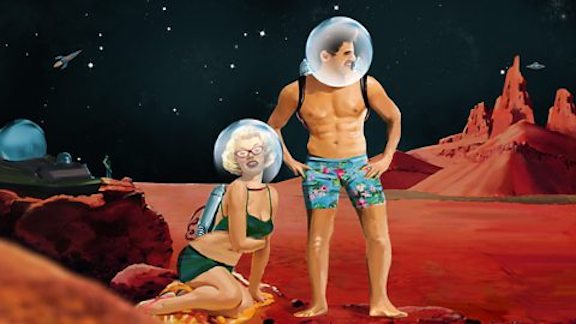BBC R4 Documentary
I was delighted to be involved in the making of a documentary for BBC Radio 4 on the subject of Martian utopias. Broadcast in March 2017 as part of Radio 4's Mars Season, the documentary — titled "A New Red World" — featured several clips in which I discussed how the red planet has been depicted in utopian literature from the 1890s to the present day. Produced by Mark Burman and presented by Ken Hollings (with whom I spoke on a panel as part of the fig-2 exhibition at the ICA in June 2015), the documentary considered a range of Martian utopias, from early Bolshevik visions of inter-planetary revolution to feminist Martian societies, peace loving druids, vegetarian fruitarian dwarves and big science terra-forming.
Here's a description of the documentary from the BBC site:
Both the astronomer Flammarion and the Russian mystic & Cosmist Nikolai Fyodorov dreamed of the dead resurrected on Mars. At the height of the Cold War mysterious messages from Mars turn out to come from God, as mankind is shocked into a new beginning in the loopy film Red Planet Mars. But the Bolsheviks had got to Mars long before that, before the revolution even in 1908 with Alexander Bogdanov's Red Star. A prophet of the Bolshevik Revolution, Bogdanov gives us a historically advanced socialist state visited by a veteran revolutionary-in fact this socialist utopia will drive him mad! Russia and then the Soviet Union ached for a future among the stars where apple blossom time would come to Mars.
In Unveiling a Parallel, 1893, two Iowan women send a visitor by plane to see how women's lives could be just as equal as men's. Why they could propose marriage & have children out of wedlock! That great mapper of Mars canals, Percival Lowell, impressed on people the desperate tale of Martian co-operation as they raced to save their species. In America the story of terra-forming emerged from science fiction to cast a powerful spell on scientists & writers. Jim lovelock, creator of the Gaia theory impishly suggesting we nuke Mars & cover it in hair spray to begin its rebirth. Then came Kim Stanley Robinson, whose vast Martian trilogy (Red, Green, Blue Mars) gives us a near utopia, won only after decades of political strife, terra-forming and a final, irrevocable break with Earth.
My contributions to the programme included a discussion of Wells' Martian alien invasion in War of the Worlds (1898), and the early feminist Martian utopia, Unveiling a Parallel: A Romance (1893) by Alice Ilgenfritz Jones and Ella Merchant, which uses Mars as a novum in which to stage an alternative world of gender equality (but, interestingly, not class equality) where women are civic leaders, successful business tycoons, and even have their own equivalents to gentleman's clubs. I also considered Alexander Bogdanov’s utopian novel Red Star (Krasnaya zvezda) (1908), in which a superior Martian culture comes to revolutionary Russia shortly after the 1905 revolution seeking suitable ambassadorial candidates to help the Martians engage with Earth. Finally, I discussed another significant early Bolshevik work of science fiction that similarly uses Mars to reflect upon the state of the young Russian republic: Alexei Tolstoy’s Aelita (1922), which was adapted for cinematic release by Yakov Protazanov in 1924 under the title of Aelita: Queen of Mars (Aelita: koroleva marsa).
My contributions to this radio documentary were informed by a chapter I had been researching for Roger Luckhurst's Science Fiction: A Literary History (British Library Press, 2017), in which I surveyed utopian and dystopian literature in the early twentieth-century period. I enjoyed the sub-section on early Russian SF and Martian utopias so much, it has subsequently expanded into a case study for my second monograph, Arcadian Revenge: Utopia, Apocalypse and Science Fiction in the Era of Ecocatastrophe, which considers how fictions of extreme environments (such as Mars, Antarctica, the deep sea, and the centre of the Earth) have allowed writers to imagine creative responses to real and perceived disasters about climate change, from the late 19th century to the present day.







 Dr Caroline Edwards is Senior Lecturer in Modern & Contemporary Literature at Birkbeck, University of London. Her research and teaching specialisms are in 21st century literature and critical theory, science fiction and post-apocalyptic narratives, Marxist aesthetics, and utopianism.
Dr Caroline Edwards is Senior Lecturer in Modern & Contemporary Literature at Birkbeck, University of London. Her research and teaching specialisms are in 21st century literature and critical theory, science fiction and post-apocalyptic narratives, Marxist aesthetics, and utopianism.
Follow / Contact